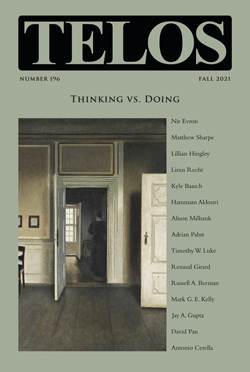Today’s episode of the Telos Press Podcast features our recent panel discussion on the causes and consequences of the U.S. failure in Afghanistan. With presentations from Telos editors Mark Kelly, Adrian Pabst, Marcia Pally, David Pan, and David Westbrook, the discussion covered various aspects of the U.S. withdrawal from Afghanistan as well as its implications for the future of the region, the promotion of liberal democracy and human rights, and the influence of the United States and the West more generally. We were also delighted to be joined by our listeners from around the globe, who posed thoughtful and provocative questions to the panel following the presentations.
The discussion picked up on a number of arguments addressed at greater length in the “Forum on Afghanistan” featured in Telos 196 (Fall 2021), our new issue, which is now available in the Telos Press store. Links to the individual articles are also provided below. If your university has an online subscription to Telos, you can read the articles at the Telos Online website. For non-subscribers, learn how your university can begin a subscription to Telos at our library recommendation page.
Forum on Afghanistan
 Afghanistan from 2001 to 2021: Blows against the Empire of Bases
Afghanistan from 2001 to 2021: Blows against the Empire of Bases
Timothy W. Luke
Afghanistan: Biden and Trump—the Same Cowardice
Renaud Girard
The Consequences of Afghanistan: Comments on Girard
Russell A. Berman
Dereliction of Duty: How the Retreat from Afghanistan Accelerates the Self-Erosion of the West
Adrian Pabst
Failed Statecraft: The United States in Afghanistan
Mark G. E. Kelly
You and What Army? The Moral Ghost in the U.S. Security Machine
Jay A. Gupta
The U.S. Failure in Afghanistan and the Future of World Order
David Pan




Brilliant
One of the fascinating things about the discussion on Afghanistan, from my perspective, is the revelation of broader political/philosophic tendencies within the Journal.
For example, I would label the David Pan analysis as a sophisticated defense of U.S. foreign policy in that country based on the theoretical lens developed by Carl Schmitt.
The analysis of Adrian Pabst, on the other hand, seems to me to find part of its inspiration in his ongoing critique of Schmitt’s thinking especially Schmitt’s pessimistic assumptions about human nature, which also appear to be a foundation for Pabst’s insightful comments about the authoritarian turn in contemporary American liberalism.
My own perspective assumes that we find ourselves today in a situation where our economic system of capitalism and our political system of constitutional democracy are encased within a hardening, largely unelected administrative bureaucracy (running both domestic and foreign policy) consisting primarily of the usual suspects–a military–intelligence–central bank monolith.
Telos might consider taking a careful look at a recent series of essays written by Paul Kingsnorth (the wonderful Irish writer) at his substack cite “The Abbey of Misrule.” He directly challenges my own perspective by arguing that what he calls our modern megamachine is at its origins largely a myth or story (intersecting here with Schmitt) that finds its nourishment in tendencies within all of us (like want and will) that can only be overcome by walking away from the myth and beginning a search for a better story.